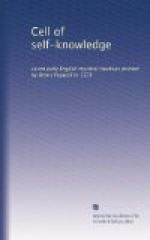And all after the worthiness and the wretchedness of this consent, thereafter it deserveth pain or bliss. If this consent be to evil, then as fast it hath, by cumbrance of sin, the office of that same spirit that first made him suggestion of that same sin; and if it be to the good, then as fast it hath, by grace, the office of that same spirit that first made him stirring[313] to that same good. For as oft as any healful thought cometh in our mind, as of chastity, of soberness, of despising of the world, of wilful poverty, of patience, of meekness, and of charity, without doubt it is the spirit of God that speaketh, either by Himself or else by some of His angels—that is to say, either His angels of this life, the which are true teachers, or else His angels of His bliss, the which are true stirrers and inspirers of good. And as it is said of the other three evil spirits, that a soul, for long use and customable consenting unto them, may be made so fleshly, so worldly, and so malicious, that it taketh upon it the office of them all; right so it is againward[314] that a soul, for long use and custom in goodness, may be made so ghostly by cleanness of living and devotion of spirit against the spirit of the flesh, and so heavenly against the spirit of the world, and so godly by peace and by charity, and by restfulness of heart, against the spirit of malice, of wrath, and of wickedness, that it hath them now of office all such good thoughts to think when him list, without forgetting, in as great perfection as the frailty of this life will suffer. And thus it may be seen how that each thought that smiteth on our hearts, whether that it be good or evil, it is not evermore the speech of our own spirit, but the consent to the thought, what so ever it be, that is ever of our own spirit. Jesu grant us His grace, to consent to the good and againstand the evil. Amen.




